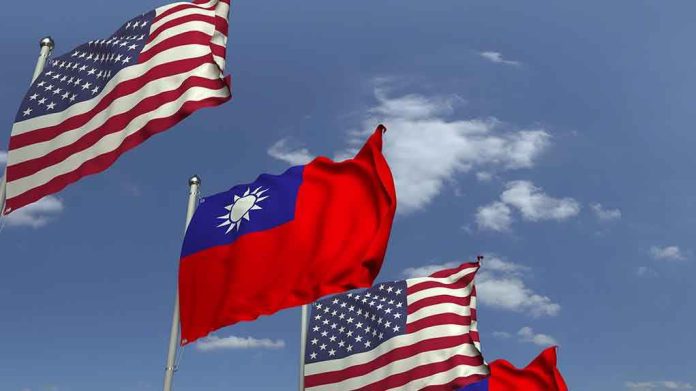
As U.S.–China relations teeter on a knife’s edge, Congress is taking a stand against the Chinese Communist Party’s transnational repression and pushing for stronger support for Taiwan, but will these bold moves pay off or lead to greater tensions?
At a Glance
- U.S. Congress introduces bills countering CCP’s global repression and supporting Taiwan.
- Legislation aims to protect dissident, ethnic, and religious groups overseas.
- Initiatives reflect a bipartisan effort to reinforce democratic values against authoritarian influence.
- Ongoing committee reviews and international reactions continue.
Legislative Push Against CCP Repression
In a decisive move, Congress has introduced a series of bills targeting the Chinese Communist Party’s oppressive tactics and bolstering support for Taiwan. This legislative effort comes amid escalating CCP efforts to stifle dissent across the globe and isolate Taiwan on the international stage. Senator Chris Van Hollen and Representative Raja Krishnamoorthi spearheaded the initiative with the Taiwan Allies Fund Act, focusing on diplomatic and economic countermeasures.
Bipartisan U.S. lawmakers are introducing bills to target China's human rights violations & transnational repression against dissidents, ethnic, & religious groups. This push comes as U.S.-China trade talks resume.https://t.co/lYXqhO4t4a
Bipartisan Bills Target China’s Human…— Spotlight on China (@spotlightoncn) July 29, 2025
These bills are not just about Taiwan, though. They are a clear message to the CCP that the U.S. will not stand idly by as they harass and intimidate dissidents and minorities like the Uyghurs and Tibetans. The message is simple: the days of unchecked oppression are numbered.
Tensions and Reactions
The introduction of these bills has sparked heated debates and reactions both domestically and internationally. In the U.S., they enjoy bipartisan support but face procedural hurdles as they wind their way through committee reviews. Meanwhile, the CCP has been vocal in its opposition, decrying what they see as foreign interference in their domestic affairs. Despite this, the U.S. remains committed to supporting Taiwan’s international participation and security.
Taiwan, under the leadership of President Lai Ching-te, has responded positively, pledging to increase defense spending and enhance self-reliance in response to U.S. calls. These developments underscore the deepening ties between the U.S. and Taiwan, a relationship that’s critical not just for Taiwan’s security but for maintaining democratic norms in the face of authoritarian pressure.
Historical Context and Current Developments
The current legislative push is rooted in a long history of CCP repression, both domestically and abroad. Over the years, the CCP has ramped up its “United Front” activities, targeting overseas Chinese communities and critics. This has been accompanied by efforts to diplomatically isolate Taiwan, pressuring countries to switch recognition to the People’s Republic of China.
In recent years, tensions have risen further following Taiwan’s presidential election in 2024 and Beijing’s military posturing. The legislative response by the U.S. is part of a broader strategy to counter this authoritarian assertiveness and support democratic allies. These bills follow in the footsteps of previous acts, like the Hong Kong Human Rights and Democracy Act and the Uyghur Human Rights Policy Act, emphasizing the U.S.’s commitment to human rights and democratic values.
Implications and Expert Perspectives
The implications of these legislative efforts are significant both in the short and long term. In the immediate future, we could see increased diplomatic friction with China and potential retaliatory measures against U.S. interests or Taiwan’s partners. However, long-term effects may include strengthened international support for Taiwan and deterrence of CCP transnational repression.
Experts are divided on the potential outcomes. Some warn that these actions could escalate tensions and lead to unintended consequences, while others argue that robust support for Taiwan and dissident groups is essential for upholding international norms. The ultimate impact of these bills will depend on their passage, implementation, and the global response.
Sources:
Taiwan Allies Fund Act Details
U.S.-Taiwan Relations Analysis





